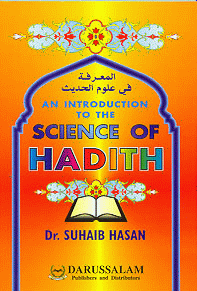Mustalah al-Hadith (Classification of Hadith)
Mustalah books speak of a number of classes of hadith in accordance with their status. The following broad classifications can be made, each of which is explained in the later sections:
|
According to the reference to a particular authority, e.g. the Prophet (may Allah bless him and grant him peace), a Companion, or a Successor; such ahadith are called marfu' (elevated), mauquf (stopped) and maqtu' (severed) respectively . |
|
According to the links in the isnad, i.e. whether the chain of reporters is interrupted or uninterrupted, e.g. musnad (supported), muttasil (continuous), munqati' (broken), mu'allaq (hanging), mu'dal (perplexing) and mursal (hurried). |
|
According to the number of reporters involved in each stage of the isnad, e.g. mutawatir (consecutive) and ahad (isolated), the latter being divided into gharib (scarce, strange), 'aziz (rare, strong), and mashhur (famous). |
|
According to the manner in which the hadith has been reported, such as using the (Arabic) words 'an ("on the authority of"), haddathana ("he narrated to us"), akhbarana (- "he informed us") or sami'tu ("I heard"). In this category falls the discussion about mudallas (concealed) and musalsal (uniformly-linked) ahadith. [Note: In the quotation of isnads in the remainder of this book, the first mode of narration mentioned above will be represented with a single broken line thus: ---. The three remaining modes of narration mentioned above, which all strongly indicate a clear, direct transmission of the hadith, are represented by a double line thus: ===.] |
|
According to the nature of the matn and isnad, e.g. an addition by a reliable reporter, known as ziyadatu thiqah, or opposition by a lesser authority to a more reliable one, known as shadhdh (irregular). In some cases, a text containing a vulgar expression, unreasonable remark or obviously-erroneous statement is rejected by the traditionists outright without consideration of the isnad: such a hadith is known as munkar (denounced). If an expression or statement is proved to be an addition by a reporter to the text, it is declared as mudraj (interpolated). |
|
According to a hidden defect found in the isnad or text of a hadith. Although this could be included in some of the previous categories, a hadith mu'allal (defective hadith) is worthy to be explained separately. The defect can be caused in many ways; e.g. two types of hadith mu'allal are known as maqlub (overturned) and mudtarib (shaky). |
|
According to the reliability and memory of the reporters; the final judgment on a hadith depends crucially on this factor: verdicts such as sahih (sound), hasan (good), da'if (weak) and maudu' (fabricated, forged) rest mainly upon the nature of the reporters in the isnad. |
|

